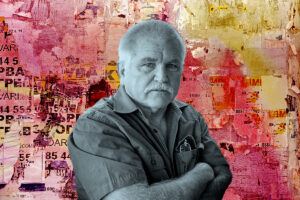The L.A. Times Scandal: A Cautionary Tale
In his latest column for Truthdig, Bill Boyarsky turns his experienced eye on the Los Angeles Times' recent editorial shake-up, the culmination of a series of questionable "housecleaning" moves, conflicts of interest and an unwise overemphasis on novelty over tradition.Sweep out the old. Bring in the new. History is bunk. Tradition at the Los Angeles Times is for dinosaurs.
Those have been the words Times bosses have lived by since the Tribune Co. bought the place. Odd new typefaces, new names for sections, features conceived and abandoned — all part of a continual housecleaning.
Now the desperate search for the new has come back to haunt the managers. The latest victim was one of the chief dinosaur killers, Andrés Martinez, who quit as editor of the editorial pages after it was revealed that his girlfriend represented a Hollywood producer chosen by Martinez to be a guest editor of a Sunday opinion section.
Conflict of interest and romance brought him down. I was surprised. In my one encounter with him, I thought he was a controlled kind of man, too smart and chilly for such commonplace failings.
I met Martinez just after he had dumped Robert Scheer’s popular column from the Op-Ed page. We were on a League of Women Voters panel at the Biltmore in Los Angeles discussing the declining circulation of the Times and other newspapers.
(A conflict-of-interest note of my own is in order. Scheer, editor of Truthdig, is an old friend who recruited me to write here and arranged to pay me a nominal sum for my efforts. And, as city editor of the Times in 2001, I was one of the first dinosaurs hunted down by the new regime.)
I told Martinez that firing Scheer was a big mistake. I said I often disagreed with Bob’s columns but he had a lot of readers. Why fire a columnist with readers when your circulation is going down? The women applauded with great enthusiasm.
He answered my question in the slippery manner of a White House press secretary. The audience had watched enough C-SPAN to know when someone was ducking the truth. A woman told Martinez she didn’t accept his explanation. He ducked again.
Martinez was in charge of the final dismemberment of the Times editorial pages, a process started by Michael Kinsley, who was installed as editor of the pages by John Carroll, the first editor of the Tribune regime.
The editorial and opinion pages were in excellent shape before the new crew decided to sweep them clean. They were not to everyone’s liking. Some people thought they were boring. They were designed for people interested in public policy, politics and, to some extent, culture. Their readers were important to the Times. They tended to be older, middle class and above, serious readers and, often, shoppers. The League of Women Voters group that Martinez blew off was a perfect example of what I am talking about.
Under the leadership of Janet Clayton, the Times won two Pulitzer prizes for editorial writing. Alex Raksin and Bob Sipchen won in 2002 for editorials on the mentally ill living on the streets and Bill Stall in 2004 for editorials on California’s state government. The serious tone of these editorials — and of all of the opinion pages — did not interfere with the paper’s ability to roll up big profits.
Clayton was moved from the job to take charge of California and Los Angeles news coverage; Kinsley, her replacement, began a frantic effort to make the section hot enough to appeal to youth. There’s nothing more pathetic than a middle-aged man trying to sell something to kids. He failed and was replaced by Martinez. Continuing the housecleaning, Martinez flew to Sacramento, where Stall was based, and summarily told Stall he was through.
Martinez continued down the innovation trail trying desperately to juice up the editorial and opinion pages. Long forgotten was their main purpose: to give readers the editors’ opinions on the issues of the day and to be a forum for discussion of what’s important to L.A., California, the nation and the world.
The plan to occasionally turn the Sunday opinion section, now called Current, over to people such as producer Brian Grazer was another of these so-called innovations. Another guest editor was supposed to be Donald Rumsfeld, an old squash partner of publisher David Hiller. Now, without a Pentagon platform for his wrongheaded views, he was to be given an edition of Current.
Various commentators on this mess have said it seems to be endemic to the troubled Los Angeles Times. But actually, it is a dramatic example of what’s happening throughout the newspaper business.
As circulation and advertising drop, newspaper managers and their consultants desperately seek new formulas, which in the business are called “innovations.” The purpose is to change the demographics, to bring in young readers. Newspapers now have “innovation teams,” usually run by middle-aged men and women. But, in seeking the elusive loyalty of the young, they are ditching what made newspapers valuable, in favor of odd changes. Thus the Times front page was redesigned with so many typefaces that it looked, as one reader put it, like a ransom note. The design was subsequently abandoned.
The business needs change. I think the L.A. Times should have a gossip column. Local news should be written in a sharp and sensational style. The website should be as hot and timely as a tabloid, spewing out news 24 hours a day. The paper should continue to build a stable of its own opinion writers. Putting Ron Brownstein on the Op-Ed page was a good idea. However, he and Patt Morrison, another Op-Ed columnist from the Times staff, shouldn’t be buried amid the nonentities signed up by people like Martinez.
But in doing this, don’t forget the Times’ legacy of greatness or its role as a voice and watchdog. Tradition is good. History is important. We learn from it.
In 1916, a Chicago Tribune reporter interviewed Henry Ford, who told him: “History is more or less bunk. It’s tradition. We don’t want tradition. We want to live in the present and the only history that is worth a tinker’s dam is the history we made today.”
These words must have lingered to guide the so-called innovators who are destroying the many qualities that made the Los Angeles Times great.
Your support matters…Independent journalism is under threat and overshadowed by heavily funded mainstream media.
You can help level the playing field. Become a member.
Your tax-deductible contribution keeps us digging beneath the headlines to give you thought-provoking, investigative reporting and analysis that unearths what's really happening- without compromise.
Give today to support our courageous, independent journalists.






You need to be a supporter to comment.
There are currently no responses to this article.
Be the first to respond.